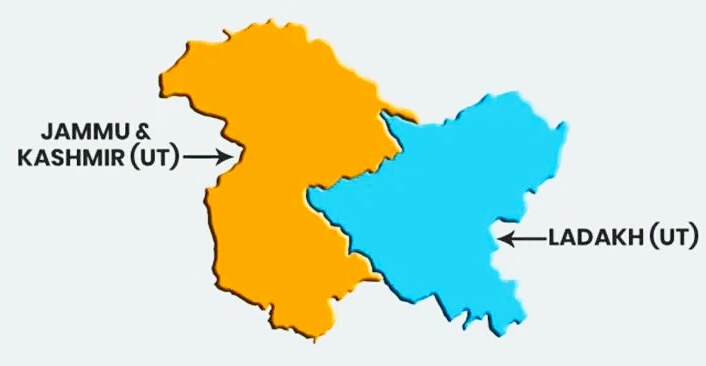On the occasion of the 144th birth anniversary of ‘Iron Man of India’ Sardar Vallabh Bhai Patel , the state of Jammu and Kashmir has formally transitioned into two Union Territories of Jammu and Kashmir and Ladakh. With this change, the political map of India will now have 28 states and 9 Union Territories.
The process of transition begins with the swearing-in of the two newly-appointed Lieutenant-Governors in Srinagar and Leh- namely Girish Chandra Murmu and Radha Krishna Mathur.
“Jammu and Kashmir and Ladakh are taking a step towards a new future today,” said PM Narendra Modi while addressing a gathering in Gujarat to mark the birth anniversary of Sardar Vallabhbhai Patel.
Recently, the special status to Jammu and Kashmir under Article 370 of the constitution was abolished by an order from President Ram Nath Kovind and the state was bifurcated into two union territories- Jammu & Kashmir and Ladakh by Jammu and Kashmir Reorganisation Act, which has come into effect today on Oct 21.
Here’s a cursory look at the big changes, which will be enforced by the creation of these Union territories:
Jammu and Kashmir will have elected legislative assembly and council of ministers headed by the chief minister for the union territory of Jammu and Kashmir. Ladakh will not have an Assembly and will be directly governed by the Union Home Ministry through the Lieutenant-Governor. The Indian Constitution and the Indian laws would be applicable in the Union Territories.
The strength of the Jammu and Kashmir assembly will be increased by seven seats to 114 from the existing 107 seats. While the strength of the council of ministers will be reduced to 10 percent of the total strength of the legislature.
The Union Territory of Jammu and Kashmir will continue to have five MPs in the Lok Sabha and will have four MPs in the Rajya Sabha. The Union Territory of Ladakh will have one MP. Panchayat would be more powerful under the new arrangement.
Jammu and Kashmir and Ladakh will have a common high court.
For the recruitment of gazetted officers, Ladakh shall come under the Union Public Service Commission or UPSC, but Jammu and Kashmir will continue to have its own Public Service Commission (PSC).
The laws related to ownership of land and property in the Union Territory of Jammu and Kashmir will be
amended.
The new Jammu and Kashmir Assembly will have a term of five years in place of the current six years.
Jammu And Kashmir & Ladakh Formally Becomes Union Territories !!























Add Comment